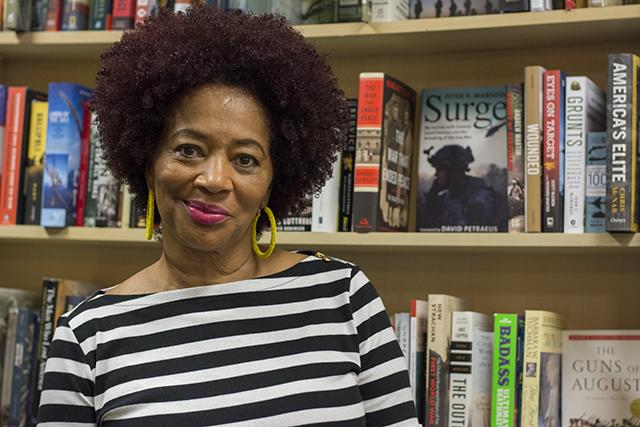No one needed to silence the crowd when New York Times best-selling author Terry McMillan took the mic Tuesday night. All eyes were on McMillan when she visited Quail Ridge Books & Music as part of a 14-city book tour promoting the paperback edition of her latest novel, Who Asked You?
According to her website, McMillan was introduced to the idea of writing through a creative writing class taught by Professor Ishmael Reed at the University of California-Berkeley. Through the class, McMillan was able to workshop an early draft of what became her first novel, Mama. McMillan entered Mama in a fiction contest and won the chance to have her manuscript published and meet an agent.
McMillan’s success continued to flourish from there. Her works include New York Times bestsellers How Stella Got Her Groove Back, Waiting to Exhale, Breaking Ice: An Anthology of Contemporary African-American Fiction, Disappearing Acts, A Day Late and A Dollar Short, It’s Okay If You’re Clueless, The Interruption of Everything, Getting to Happy and Who Asked You?
McMillan opened with personal anecdotes answered by laughter from the crowd as it connected with the beloved author in person. From mentioning her outfit choice and her affection for her “fun but cheap” bracelet to sharing the fact that she will see her son for the first time this week after two years, McMillan allowed the audience to feel familiar with her and break down the celebrity wall.
The novel portrays the story of a mother leaving her two sons in the protection of her own elderly mother, tasking the older woman with raising her two grandsons. With other worries such as a sick husband and a son in prison, the last thing the elderly woman needs is two more children to rear. McMillan identifies this situation as a second shift because two-thirds of a person’s life is over but he or she is faced with raising a child again.
“I have the utmost respect for these grandparents,” McMillan said. “I do not know how they do it.”
McMillan enlightened her eager audience about the reason she chose the particular writing structure for Who Asked You? and why she included the children characters as narrators.
“I wrote the story from 15 different character points of view,” McMillan said. “I thought that children often do not get a say. A lot of people do not listen to them. People often do not listen to how the children feel, especially when it comes to being abandoned.”
According to McMillan, much of the children-related themes in Who Asked You? stem from personal aspects of her life.
“I do know people in my family who have been foster parents and they should not have been,” McMillan said. “I know children know two things: one, when they are loved and two, when they are not. They are not stupid, and they have feelings, and sometimes the reason they do not get to express the feelings verbally is because no one asks them. Sometimes they express the feelings in whole other ways.”
In addition to reading an excerpt from the novel and signing customers’ copies of her numerous books, McMillan answered questions from the audience and discussed aspects of her career and writing process.
One audience member asked McMillan how she felt about being classified as an African-American female author. She answered by telling how she wrote the New York Times about the situation. McMillan challenged the Times by asking how it had the authority to call literature written by females “chick lit.” She said she asked why the Times didn’t call works written by white male authors “dude lit.”
Her humor never faltered. When asked what she would be if she were not a writer, McMillan responded by joking, “That is like asking me what I would be if I was not black. I don’t know!”
When signing book copies, a fan asked for the bracelet she wore during the reading. After a moment of shock, McMillan furrowed her brow, handed the bracelet to the fan and said, “You better wear it,” after which she broke into a huge grin. The store associate laughed and expressed the disbelief about the exchange, to which McMillan smiled and said, “I gave her the bracelet because she asked for it.”








